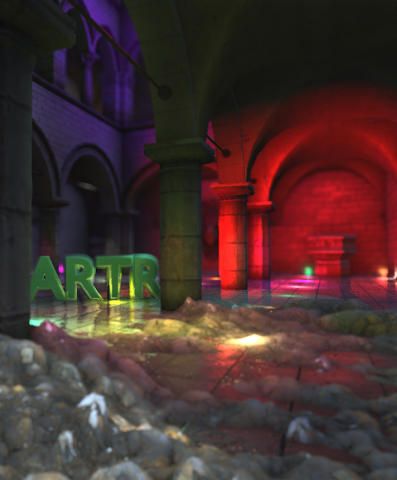Announcements
You rock!
Subject and aim
The course teaches fundamental real-time rendering techniques like tessellation, deferred shading, and screen-space effects, and discusses bleeding-edge topics like real-time global illumination, physically-based rendering, and optimizing GPU performance.
The goal is to give you a firm understanding of all constituents of a modern real-time rendering engine!
Communication
The whole communication runs over the TUWEL-Page. Information regarding the exercises are also available on TUWEL.
Please register for the course on the TISS-Page!
In case of problems with TISS, TUWEL and for personal matters, feel free to send us an email: artr@cg.tuwien.ac.at
Schedule
The course will take place in the Seminar Room FAV 05 (formerly: Seminarraum 186), in Favoritenstr. 9-11 / 5th floor.
Lectures are scheduled on Tuesdays, 13:00-15:00 c.t. and will be given in English.
|
|
Assignment #1 goes online | |
| 10.03.2020 | 13:00-15:00 | Johannes Unterguggenberger Introduction, Rendering pipeline re-cap, Normal Mapping re-cap, Introduction to the exercise framework for the first two assignments. |
| 17.03.2020 | 13:00-15:00 | Bernhard Steiner Physically-based Shading, Order-Independent Transparency |
|
|
Assignment #2 goes online | |
| 24.03.2020 | 13:00-15:00 | Stefan Ohrhallinger Geometry and Tessellation |
| 30.03.2020 |
|
Deadline for Assignment #1 |
| 31.03.2020 | 13:00-15:00 | Bernhard Steiner Deferred Shading |
| 21.04.2020 | 13:00-15:00 | Philipp Erler Real-Time Physics |
| 27.04.2020 |
|
Deadline for Assignment #2 |
|
|
Assignment #3 goes online | |
| 28.04.2020 | 13:00-15:00 | Johannes Unterguggenberger Introduction to Vulkan Introduction to the exercise framework for assignments #3 and #4 |
| 05.05.2020 | 13:00-15:00 | Assignments #1 and #2 solution presentation and group discussion (compulsory attendance) |
| 12.05.2020 | 13:00-15:00 | Michael Wimmer Soft Shadows and Real-Time Global Illumination |
| 19.05.2020 | 13:00-15:00 | Lukas Gersthofer Real-Time Ray Tracing |
| 26.05.2020 |
|
Deadline for Assignment #3 |
|
|
Assignment #4 goes online | |
| 26.05.2020 | 13:00-15:00 | Christian Freude and Joao Afonso Cardoso Screen-Space Effects |
| 09.06.2020 | 13:00-15:00 | Assignment #3 solution presentation and group discussion (compulsory attendance) |
| 16.06.2020 | 13:00-15:00 | Markus Schütz Point Rendering |
| 23.06.2020 |
|
Deadline for Assignment #4 |
| 23.06.2020 | 13:00-15:00 | Bernhard Kerbl Optimizing GPU-Performance |
| 30.06.2020 | 13:00-15:00 | Assignment #4 solution presentation and group discussion (compulsory attendance) |
Assignments
The lecture is accompanied by assignments that cover advanced but fundamental techniques of real-time rendering. Assignments are programming exercises in frameworks based on (modern) C++ and OpenGL or Vulkan. Ready-to-use versions of the frameworks and the assignments will be provided for Visual Studio 2019.
All assignments will be available on TUWEL at the dates stated above.
| Assignment #1 | Normal Mapping Tangent Space, Blinn-Phong Shading, Physically-based Shading (bonus) |
10 points (+10 bonus points) |
| Assignment #2 | Hardware Tessellation PN-Triangles, Adaptive Tessellation, Displacement Mapping |
30 points (+20 bonus points) |
| Assignment #3 | Deferred Shading and Synchronization Vulkan Synchronization, Deferred Shading, MSAA |
30 points (+14 bonus points) |
| Assignment #4 | Screen-Space Effects Screen-Space Ambient Occlusion, HDR Rendering + Tone Mapping, Screen-Space Reflections, Temporal Anti-Aliasing, Real-Time Ray Tracing |
30 points (+22 bonus points) |
Every assignment will feature a set of basic tasks and bonus tasks. Solving bonus tasks will allow you to earn more than 100% of the regular point maximum for this assignment. With this, you may compensate lower percentages in other assignments.
Grading
| 5 | 00 - 49 points |
| 4 | 50 - 62 points |
| 3 | 63 - 74 points |
| 2 | 75 - 87 points |
| 1 | 88+ points |
To be perfectly clear on this: You will not get a positive grade if you do not present in one of those three events, even if you have 50+ points.
Your participation and constructive contribution to the group discussions will influence your final grade. A positive, constructive performance can improve your final grade while a lack thereof can impair your final grade. These events replace individual submission talks, so use them to show us that you are the author of your submitted solutions and let's learn from each other in profound group discussions.
Course materials
- Real-Time Rendering, Fourth Edition, by Tomas Akenine-Möller, Eric Haines, Naty Hoffman, Angelo Pesce, Michal Iwanichi, and Sébastien Hillaire, A K Peters/CRC Press, 2018
- OpenGL Insights, First Edition by Patrick Cozzi and Christophe Riccio (July 23, 2012)
- Graphics Shaders: Theory and Practice, Second Edition by Mike Bailey and Steve Cunningham (Nov 8, 2011)
- OpenGL 4 Shading Language Cookbook, Third Edition, by David Wolff, Packt Publishing, 2018
